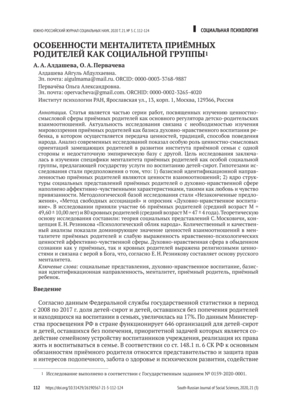Аннотация
Статья является частью серии работ, посвященных изучению ценностно-смысловой сферы приёмных родителей как основного регулятора детско-родительских взаимоотношений. Актуальность исследования связана с необходимостью изучения мировоззрения приёмных родителей как базиса духовно-нравственного воспитания ребенка, в котором осуществляется передача ценностей, традиций, способов поведения народа. Анализ современных исследований показал особую роль ценностно-смысловых ориентаций замещающих родителей в развитии института приёмной семьи с одной стороны и недостаточную эмпирическую базу с другой. Цель исследования заключалась в изучении специфики менталитета приёмных родителей как особой социальной группы, предлагающей государству услуги по воспитанию детей-сирот. Гипотезами исследования стали предположения о том, что: 1) базисной идентификационной направленностью приёмных родителей являются ценности взаимоотношений; 2) ядро структуры социальных представлений приёмных родителей о духовно-нравственной сфере наполнено аффективно-чувственными характеристиками, такими как любовь и чувство привязанности. Методологической базой исследования стали «Незаконченные предложения», «Метод свободных ассоциаций» и опросник «Духовно-нравственное воспитание». В исследовании приняли участие 66 приёмных родителей (средний возраст M = 49,60 ± 10,00 лет) и 80 кровных родителей (средний возраст М = 47 ± 4 года). Теоретическую основу исследования составили: теория социальных представлений С.Московичи, концепция Е.Н.Резникова «Психологический облик народа». Количественный и качественный анализы показали доминирующее значение ценностей взаимоотношений в менталитете приёмных родителей и слабую выраженность нравственно-психологических ценностей аффективно-чувственной сферы. Духовно-нравственная сфера в обыденном сознании как у приёмных, так и кровных родителей выражена религиозными ценностями и связана с верой в Бога, что, согласно Е.Н.Резникову составляет основу русского менталитета.
Ключевые слова
Информация о финансировании
Исследование выполнено в соответствии с Государственным заданием № 0159-2020-0001.
Библиографические ссылки
Алдашева, А.А., Зеленова, М.Е., Сиваш, О.Н. (2019). Ценностно-идентификационная направленность и особенности менталитета приёмных родителей. Южно-российский журнал социальных наук, 20(3), 153–166.
Алдашева, А.А., Зеленова, М.Е. (2017). Профессиональный менталитет приёмных родителей как фактор успешности замещающей семьи. Вестник Университета Российской академии образования, 5, 23–29.
Володина, Л.О. (2010). Духовно-нравственные ценности воспитания в русской семье: национальный опыт и региональные особенности. Вологда: ВГПУ.
Завалова, Н. Н, Ломов, Б. Ф, Пономаренко, В.А. (1986). Образ в системе психической регуляции деятельности. Москва: Рипол Классик.
Макаренко, А.С. (1988). О воспитании. Москва: Издательство политической литературы.
Маркина, О.А. (2019). Мотивация и родительские установки к усыновленному ребенку у женщин (Кандидатская диссертация). Краснодар.
Министерство просвещения Российской Федерации. Официальный сайт. Режим доступа https://edu.gov.ru
Михина, Е.М. (сост.) (1995). История ментальностей и историческая антропология: Зарубежные исследования в обзорах и рефератах. Москва: РГГУ.
Московичи, С. (1995). Социальные представления: исторический взгляд. Психологический журнал, 16(2), 3–14.
Мухамедрахимов, Р.Ж. (2001). Мать и младенец: Психологическое взаимодействие. СПб.: Издательство С.-Петерб. ун-та.
Мухамедрахимов, Р.Ж. (2018). Интервью "Инициативам ребенка всегда нужно следовать, они не должны оставаться без внимания". Современное дошкольное образование, 3, 47–53.
Ослон, В.Н. (2015). Организационная модель психосоциального сопровождения замещающей семьи. Психологическая наука и образование, 7(2), 1–13.
Плетенёва, М.В., Мухамедрахимов, Р.Ж. (2013). Особенности взаимодействия детей раннего возраста с родителями в замещающих семьях. Вестник Санкт-Петербургского университета, 12(3), 22–25.
Попова, Е.А. (2010). Понятие профессионального менталитета в научной литературе. Казанский педагогический журнал, 2(80), 47–55.
Резников, Е.Н. (2014). Психологический облик русских: (на материале исследования жителей Костромской области). Москва: Институт психологии РАН.
Семейный кодекс Российской Федерации от 29 декабря 1995 г. N 223-ФЗ (ред. от 06.02.2020) по состоянию на 3.09.2020. Режим доступа consultantplus.ru
Федеральная служба государственной статистики. Официальный сайт. Режим доступа https://www.gks.ru/folder/13807?print=1
Шнейдер, Л.Б. (2019). Семейное консультирование. Молодая семья и ребенок дошкольник. Москва: Издательство Юрайт.
Юревич, А.В. (2013). Структурные элементы национального менталитета. Психологические исследования, 6(29), 12.
Rateau, P., Moliner, P., Guimelli, C., Abric, J.C. (2012). Social Representation Theory. Retrieved from https://www.researchgate.net/publication/292251059_Social_representation_theory
Slipp, K. (2017). The Image of a Child and the Reggio Emilia Philosophy. University of Victoria. Retrieved from https://www.reggiochildren.it/en/reggio-emilia-approach/


